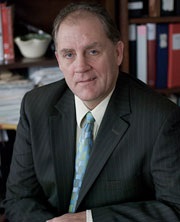Brian Isetts Discusses Expectations of Pharmacists in the Healthcare System

Professor Brian Isetts, who spent a recent sabbatical as a health policy fellow with the Center for Medicare and Medicaid Innovation, presented “Progress Toward Goals: Building A Medication Use System Our Country Deserves” at the 2013 Samuel W. Melendy Lecture, which was held on both the Twin Cities and Duluth campuses in March.
“Two critical goals are patient-specific drug therapy treatment goals, and a true medication use system in which patients routinely achieve treatment goals with zero tolerance for medication harms,” explained Isetts, who has now completed his leave and is back at the college.
According to Isetts, recent changes in health delivery have enabled providers to develop patient-specific care plans: one in which the patient is always in the room and the patient always comes first.
“This is a significant paradigm shift from the days in which health care professionals provided care to patients rather than with patients,” he said.
Additionally, Isetts described the medication use system our country can have as one in which:
- Every drug is assessed to ensure it has an an intended medical use, is effective and safe, and able to be taken by the patient as intended
- Patients, family members and caregivers contribute to establishing realistic, achievable goals of therapy
- There are clear care plan responsibilities for achieving goals of therapy
“In order to achieve this medication use system we deserve, there needs to be collaboration with all health team members across integrated healthcare systems,” said Isetts.
Isetts said Minnesota health systems are demonstrating the path to improvements in clinical and economic outcomes for others to follow.
“Over the past 20 years, the profession of pharmacy has devoted considerable resources toward developing evidence supporting the fact that when pharmacists are integrated in health care delivery providing comprehensive medication management, patients achieve clinical outcomes with reductions in total health expenditures,” Isetts said. “One of the reasons why we did all this hard work is because employers, payers and health plans told us that they would pay us for our contributions if we could save them money. We did much more than save money— we’re saving lives.”
Isetts is also encouraged by the work that’s being done at the federal level to make the health care system more effective and functional.
“Our country is moving away from a fee-for-service reimbursement system to one in which health systems and providers are rewarded for good patient outcomes, and conversely are penalized for poor patient outcomes,” said Isetts. “This is really good news for individuals who take medications and those who help patients take medications that are properly indicated, effective, and safe for them.”
Isetts told students that when they become practitioners they will play an instrumental role in improving care and reducing health care costs.
“Patients need to know there is a health care provider who can manage their medications, rather than having medications manage their lives,” he said. “When we prepare you properly at this college of pharmacy, you will know exactly how to get organized, where to start, how to develop a therapeutic relationship, and what to do to assess each of the patient’s medications to ensure intended medical use, effectiveness, safety and ability to be taken to achieve goals of therapy.”